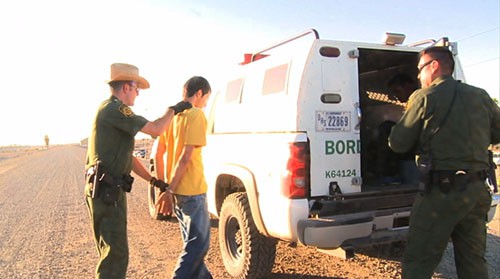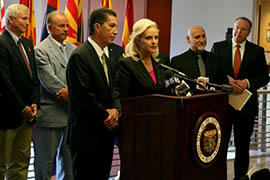Cronkite News has moved to a new home at cronkitenews.azpbs.org. Use this site to search archives from 2011 to May 2015. You can search the new site for current stories.
Sex-trafficking task force wants tougher laws against johns
PHOENIX – A task force Gov. Jan Brewer assembled to address human trafficking plans to recommend laws toughening penalties for johns in child prostitution cases and raising public awareness of the problem.
“I think we, together, cannot allow this unthinkable, evil, sick practice to continue,” Brewer said Wednesday as the group held its final meeting.
Brewer convened the Governor’s Task Force on Human Trafficking in April looking toward the 2015 Super Bowl, to be hosted by Glendale. The committee will make its formal recommendations to the governor next week.
Under current state law, child prostitution involving a person age 15 to 17 carries a penalty of four months to two years in prison if a prosecutor can’t prove the defendant knew the person’s age. Cases in which defendants did know a person age 15 to 17 was underage carry seven- to 21-year sentences.
Prostitution cases involving those younger than 15 are carry more severe sentences regardless of whether defendants claim to know the person’s age.
Rep. Doug Coleman, R-Apache Junction, said he expects the state Legislature to support cracking down on buyers of sex.
“I just don’t understand why we have a law that seemingly protects the demand side, the johns,” he said. “Because that’s really, in my opinion, what it’s designed to do.”
Bills from the House and the Senate that would have amended Arizona’s criminal statutes on child prostitution were held in committees this past session.
The draft recommendations said the committee will also call for an education campaign encouraging zero tolerance for human trafficking in an attempt to change the way society views paying for sex.
Cindy McCain, wife of Sen. John McCain and committee co-chair, said the success of the campaign will rely on the “good spirits and good hearts” of Arizonans.
“We look forward to working with tons of volunteers,” McCain said.
Among more than two-dozen other draft recommendations is changing to state policies and procedures to give victims easier access to services.
Gilbert Orrantia, director of the Arizona Department of Homeland Security and committee co-chair, said the recommended responses are balanced between statutory changes and awareness campaigns.
“It’s a little bit of everything; it’s multifaceted,” Orrantia said. “It’s not one that one avenue is going to solve.”
Taryn Mastrean, spokeswoman for advocacy group Shared Hope International, said Arizona’s laws are the key to reducing human trafficking in the state.
“Awareness campaigns are important, but if buyers aren’t deterred by penalties, you’re not really addressing the problem,” said in a telephone interview.









